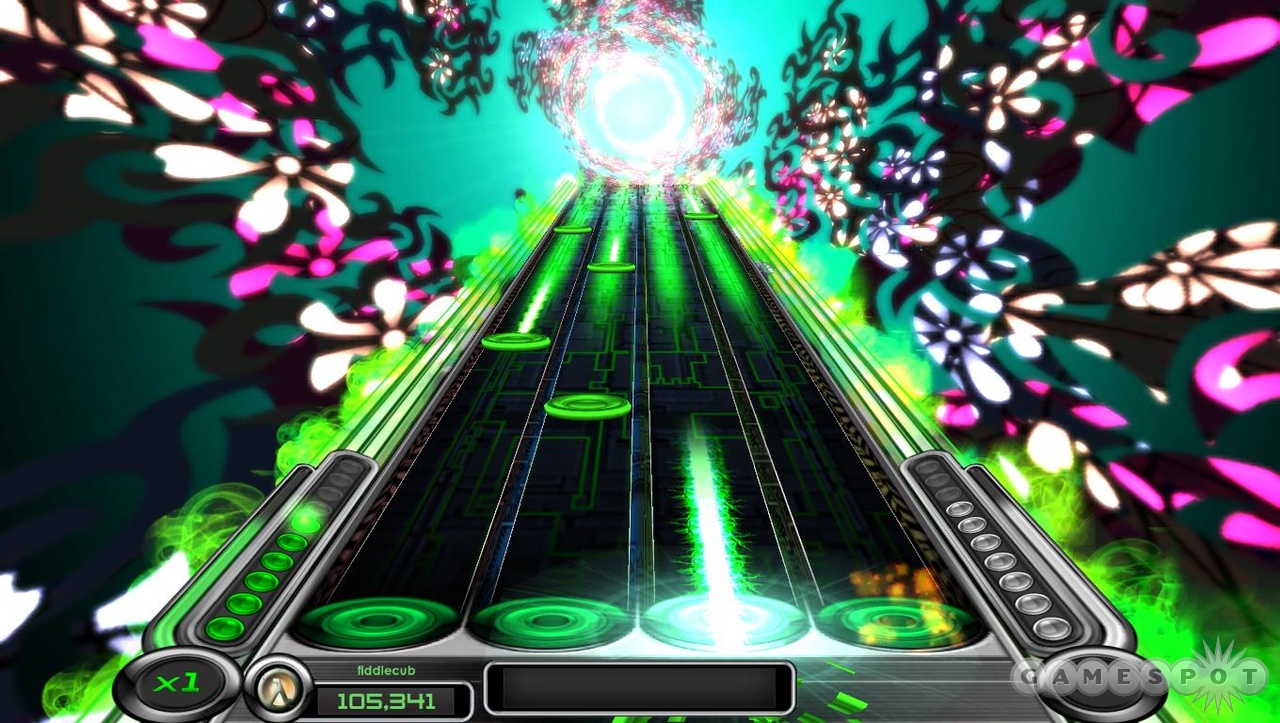If you're going to rip off the Guitar Hero series, you should at least get the basics right, and that's where Rhythm Zone falls short. In Rhythm Zone, like in Guitar Hero, blocks of different hues representing musical notes travel toward the bottom of the screen, and you press the proper buttons as the blocks cross the bottom of the note highway. The game's hook is that rather than sticking with a predesignated tracklist, it lets you use your own music in addition to the small set of included songs. It's a great idea, but in practice, it's often a mess. While most songs are at least playable and occasionally enjoyable, few of them result in note structures that properly match the tune, let alone replicates the act of making music. You can plug in a Windows-compatible guitar controller if you want to inch closer to a music-making experience, but lack of strumming support makes this an incomplete option. While developer Sonic Boom deserves credit for letting users personalize their music game experience, Rhythm Zone proves that there's no substitute for a carefully constructed note chart that matches the music it accompanies.
From purely a feature standpoint, Rhythm Zone is a noticeably bare experience. You can either play a random sequence of tracks (think of it as a shuffle option) or manually select a single track from your list. Surprisingly, there is no option to create your own playlist, so you are stuck either with a random playlist, or one tune at a time. The game includes several interesting tracks you can download, but of course, the ability to use your own music is its greatest selling point. Unfortunately, importing your music files is not necessarily the simple process you'd hope it to be. On some occasions, we were able to successfully import the selected file, and the game helpfully identified it using its built-in last.fm integration. On others, the import process just hung indefinitely, though sometimes, such tracks were still successfully imported but could only be played after canceling the import and restarting the game.
Once you get around to playing a tune, you appreciate that the game can create a playable track that stays more or less in rhythm with the chosen music. This assumes that the music has a steady and straightforward beat, however. Rhythm Zone tends to get confused by more complex music, sometimes sending down a succession of notes that has no discernible connection with the tune. It keeps to the beat more often than not--though that isn't to say that you ever get the sense that what you are doing on your keyboard or controller is closely tied to the music. Chords come rolling past at random times, you play rhythms that only seem vaguely related to what you hear, and many tracks come across as messy and uncomfortable. Of course, this is because Rhythm Zone analyzes the file to create its note highways, whereas the highways in games like Guitar Hero and Rock Band are specifically designed for each song. Thus, with so much randomness, Rhythm Zone simply isn't as much fun to play as its progenitors, nor does it even remotely re-create the feeling of playing a real instrument, even if you plug in a guitar controller.

It's a shame that the basics don't fall into place as they should, given that some of Rhythm Zone's peripheral aspects are competently designed. It's also a shame that the leaderboards aren't better integrated into the game; for example, it would be nice to see how you did after playing a song, rather than having to enter a separate menu to check. Nevertheless, scores are updated immediately, and even if no one else has played a particular song, you can still keep track of your own scores because there is a leaderboard created for every imported song. There are also some nice background visualizations that give your sessions a bit of flair, though in time, you might wish there were more of them. One visual touch that doesn't come across so successfully is the way the note highway occasionally tilts to one side or the other, apparently to add a bit of challenge. It's more annoying than anything else, though, for some reason, it didn't happen when we played in a 4:3 resolution.
Various games have allowed users to import their own tracks with different degrees of success. But unlike games like Audiosurf and Beat Hazard, Rhythm Zone doesn't just use the music to affect the gameplay--it's a wholesale imitation of a series in which the gameplay and the music are inextricably linked. Much of what makes Guitar Hero fun is that it makes you feel as if you're making music. Rhythm Zone's relatively random sequences of notes may generally keep to the beat, but most tracks are clumsy and uneven, certainly nowhere near the quality you'd find in a Guitar Hero or Rock Band game. Being able to use your own music library makes Rhythm Zone sound like an appealing experience, but even at $9.99, it's too buggy and inconsistent to warrant a purchase.